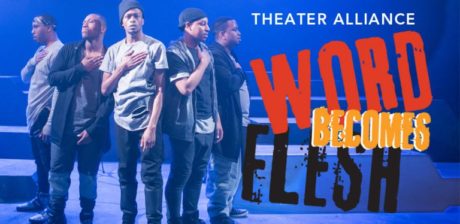Winner of five Helen Hayes Awards last season, Theater Alliance’s production of Word Becomes Flesh is now playing at Anacostia Playhouse in an encore presentation that is garnering even more acclaim. Having seen both productions, I sensed something in it had now changed—something I could not find words for but something powerful and significant. I decided to ask the director, Psalmayene 24, if he would explain what changed and why, and I was grateful that he agreed.
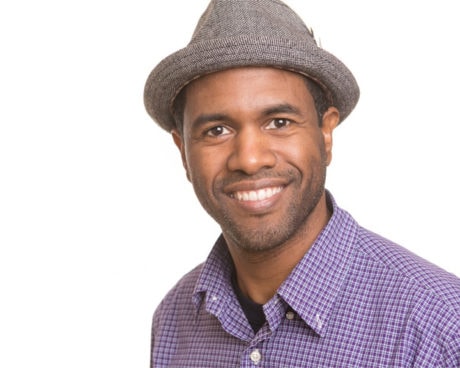
John: Word Becomes Flesh was a huge success last season. When you remounted it, what were your hopes?
Psalmayene 24: We knew that the new production would be touring right after this encore presentation. So we wanted to create a production that would work as a self-contained theatrical event at Theater Alliance and that would also be easily and seamlessly transferred to different touring venues and houses. So that was one challenge: to create a piece that we knew could work in multiple settings while also really being the fullest expression of itself at the Anacostia Playhouse.
Another thing was refinding the soul of the piece. I knew that what we did previously clearly worked, but I also wanted to honor where we are now in time as a country, as a community. That was an exacting tightrope that I also had to walk so that I wasn’t just rehashing what we did before, but I was still allowing myself and the team to be as creative as possible.
What did you tell the cast when they reunited?
The day of our first rehearsal there was a solar eclipse that was happening, and my wife sent me a text message saying she just saw that the same date was the anniversary of the first day of Nat Turner’s rebellion. That was quite a coincidence. She also told me that he had seen a solar eclipse earlier that same year and took it as a sign to go ahead and carry out his rebellion. So I told the cast about this news but I also made sure that we knew that part of the reason we were doing this play is to honor those who came before us and specifically those of our African ancestors who were enslaved and brought to this country.
I think that specter, that memory of slavery, seems to exist in much black art that is created in America. Sometimes it’s overtly and intentionally mentioned and sometimes it’s not. But it’s bubbling underneath a lot of the art that black artists create. So I wanted to make sure that we were conscious of being connected to a legacy of freedom fighters, and I wanted to put the production and the play and our creativity in that context.
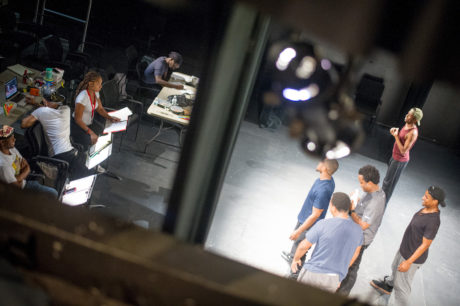
The piece begins with an extraordinary scene of breathing as one, like the five cast members are the same being. And throughout the piece, black men’s bodies together are present through spoken word and movement—and it’s like you are creating a new common language of connection and expression, a language that is grounded in the painful particulars of black men’s lives in the world but with a kind of openness and vulnerability that would be unsafe in the world.
That is exactly within the world of what my intention was for the piece. I wanted us to see black men in a space that transcended blackness, that transcended maleness, that even transcended our humanness. And I wanted us to see black men in the context of a universal and cosmic energy. So that’s where I wanted to start the piece. And then I certainly wanted us to see black men being vulnerable and comfortable with each other physically, emotionally, spiritually, and all the rest.
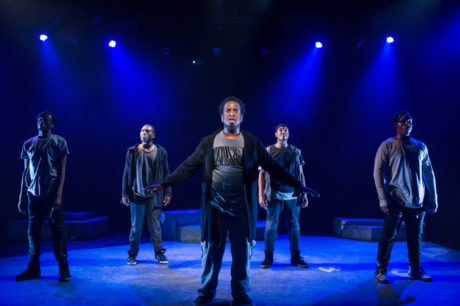
The text is one young black man’s voice, in the form of letters by the playwright Marc Bamuthi Joseph to his unborn son, and he wrote it when his own partner was pregnant. It’s very specific autobiographically, yet it tells a universal story about black fathers and sons. What struck me in performance was that as bonded as the ensemble seems, each actor also stands out as distinct presence. Each one—Louis E. Davis, Chris Lane, Clayton Pelham, Jr., Gary L. Perkins III, and Justin Weaks—has at least one powerful soliloquy. And it’s as if they are not performing some character but playing out their own personal stake in the story as black sons. There’s amazing conviction in each. Did the individual cast members relate personally to certain passages of the text? And was that part of the process of rehearsing?
Yes. After our audition process, I began thinking about which actors would deliver which monologues, and I cast the show thinking about the different natures of the monologues and the essence I saw in each actor. Once I broke the script down and divvied out the monologues to the different actors, after that initial allotment, we stayed with the pieces that each actor had. It was really an intuitive sense of which pieces would match the personalities and essence and humor and gifts of each actor.
Were there particular passages that you personally connected with?
The N-word mentality section. I think that passage is searing because of its analysis not only of racism but racism’s connection to capitalism and the history of slavery—not only its content but also the style of that passage.
I must admit
I’m whipped weak by greed’s fleet genes running through my core
I got mounds of self-hate behind the closet door of skeletons and secrets
Wearing sins and freidrich neitzsche’s brilliant theories
But I grow weary drawing defenses against self-constructed attacks
I try to relax
Contemplate my link to ignorance
Which makes no sense
Cuz I GOTS knowledge
I knowTimbo, Polo, Nike, Moschino, Nautica, Hilfiger, Versace, Vuitton, dolce and gabbana, prada, kani , levi’s, bk, ck, dkny, anne klein Fubu Guess rolex lex beamers benz
I know them all
And I know the ends don’t justify the means
I know god is rectangular and grayish green
I novus ordo seclorum don’t include me
I know how to serve my dignity up on a platter
I know how to serve my master
I know how to run in place
Faster and smoother than panthers and cougars and coons
The poetry and the rhythm touch me in a way that is very deep. And it also really makes me think about this connection, this intimate and deliberate connection, between racism and capitalism. You cannot divorce money from the equation. And when we start to think about how best to obliterate racism, capitalism has to be part of that conversation. So I think from an institutional point of view we have to think about resources when it comes to dismantling racism. The first step is of course seeing each other, not just black people but all people of color, as equals and treating them as such, but then being really mindful about resources and money. There’s a big conversation about reparations that’s still going on. I’m totally in support of reparations for slavery but I think it needs to be done in a very responsible way that maybe includes free higher education and health care and housing, not necessarily just cash.
There’s a scene when the actors are lying next to each other head to toe as if crammed into a slave ship, and one by one they bolt upright as if from a nightmare and say “Chicago!” “Baltimore!” “Fergusson!” “Bed Stuy!” I found that scene a profound way of saying that now is not far removed from then. Would you say more about how you brought what’s happening in the world today into the world of the play?
One of the main engines behind the piece is the physicality. And part of our approach is using the physicality to connect the past and the present. So thinking about physically what are our feelings and recollections and senses of the past and then connecting that physicality with our contemporary physicality. Some of those movements and physical images can be stereotypical, can be archetypical. But I wanted to play with a range of movements that were able to link and find our connections to the past and really pull us and jolt us into the present.
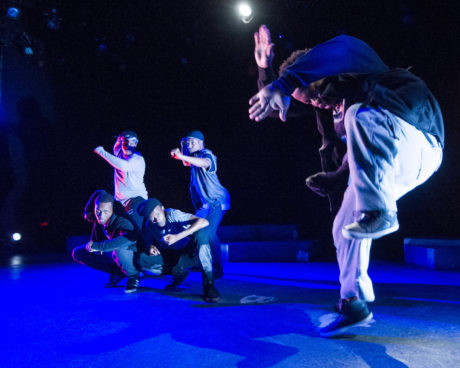
There are many reasons people should see this show if they haven’t seen it. As my DCMetroTheaterArts colleague Ramona Harper wrote eloquently in her review:
What does it mean to be a black man in the 21st century? Word Becomes Flesh, an encore production of the Theater Alliance, responds by totally embracing black masculinity in a shattering performance of the spoken word of hip hop culture. Its over-the-top testosterone slam dunks and power punches as it empowers the black man of today, while giving hope to the future generations of everyone. It uses the power of the word in a theatrical experience that is, ironically, almost indescribable.
But also, having been moved by Word Becomes Flesh the first time, I think there’s a really important reason to see it again, and it has to do with the physicality. The text is exactly the same as last season, but the physicality has changed. Could you say how, and why?
We’re in a different era right now. Obama was president the first time. There’s also something about having the same original incredible cast and having them come back to the piece. They’ve changed as men. They’ve continued to grow and mature. And there’s something about life experience that is emitted and communicated through your movement, whether that’s dance or the tableaux that we do, different physical forms that we do in the piece. So part of it is personal change from the performers. And then there’s this environmental change that has gone on. And I also think there’s a change that has happened with the audience and their eyes. We’re seeing the piece differently now because we’re living in a different time. And then from a very practical sense, the piece now is in a proscenium configuration, so that’s going to affect you in a more potent way, I believe, than how we did it before—not to say it wasn’t potent before, but the energy feels more streamlined now, because there’s one main perspective. Before we were in this three-quarter configuration, so it was wider. Now it’s sleeker. So I think the piece is even more effective now, partly because of the setup.
More concentrated and stronger I would say.
More concentrated, exactly.
Theater in general has been critiqued from outside and inside for its failure to represent all the many whom the mainstream has marginalized. And still what passes for “diversity” in the theater often misses the mark. But I get a sense from Word Becomes Flesh in performance—also from its genesis and the inspiration throughout the process by which it came to life at Theater Alliance—that there might be lessons to share with the theater community at large: lessons about how marginalized lives can be represented on stage honorably and honestly. So I want to ask you both personally and professionally: What could white mainstream theater learn from this production of Word Becomes Flesh?
You have to search for pieces that represent diverse voices or accurate representations. That’s really what it boils down to. Because not only are those voices or plays or artists not given exposure; sometimes they’re being suppressed by institutionalized circumstances. You have to actively work to actually find the material and the artists. We are out here. The artists exist, we’re available. Now, the beauty of it is that many of us are not waiting to be discovered but we’re creating our own opportunities. I think it’s just a matter of taking what may seem like a risk on a piece or an artist who you’re not familiar with who may happen to be an artist of color, and really using a new set of eyes to actually see the beauty and value of these artists and the material they create. I feel like what I’m saying is not quite enough. But I think ultimately each person has to dig within themselves and just try to do the right thing.
Running Time: One hour, with no intermission.
Word Becomes Flesh plays through October 8, 2017 at Theater Alliance performing at the Anacostia Playhouse – 2020 Shannon Place, SE, in Washington DC. For tickets, call the box office at (202) 241-2539, or purchase them online.
LINKS:
Theater Alliance Launches Word Becomes Action Festival by Natalie Graves Tucker
Review: ‘Word Becomes Flesh’ at Theater Alliance at Anacostia Playhouse by


